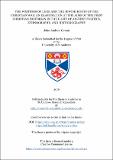Files in this item
The writings of Luke and the Jewish roots of the Christian way : an examination of the aims of the first Christian historian in the light of ancient politics, ethnography, and historiography
Item metadata
| dc.contributor.advisor | Wright, N. T. (Nicholas Thomas) | |
| dc.contributor.author | Cowan, John Andrew | |
| dc.coverage.spatial | xv, 261 p. | en_US |
| dc.date.accessioned | 2017-05-23T15:22:25Z | |
| dc.date.available | 2017-05-23T15:22:25Z | |
| dc.date.issued | 2017-06-20 | |
| dc.identifier.uri | https://hdl.handle.net/10023/10822 | |
| dc.description.abstract | The purpose of this thesis is to investigate the motivations behind the theme of Christianity’s Jewish roots in the writings of Luke. In particular, this study is a critical examination of a set of increasingly influential proposals that all maintain that Luke’s goal in highlighting the Jewish roots of the Christian movement is to gain cultural or political capital in Graeco-Roman society. According to these proposals, the Jewish people had an ancient and therefore respected heritage, and Luke attempts to leverage this situation to the church’s advantage. In order to evaluate these proposals, this thesis compares Luke’s writings to historical works written by two of Luke’s near-contemporaries: Dionysius of Halicarnassus and T. Flavius Josephus. The works of both Dionysius and Josephus have been set forth as parallels to aspects of the recent proposals about Luke’s writings, especially Luke’s purported interest in the respect that comes from antiquity, and thus their writings make an excellent control group against which to test these proposals. The central argument of this thesis is that a careful examination of these authors’ writings reveals that Luke’s aims are very different from those of Dionysius and Josephus. The latter two clearly and explicitly pursue cultural and political agendas by emphasizing the respectable ancient heritages of the Romans and the Jewish people, but Luke appears to be unembarrassed by the newness of the Christian movement, and he often depicts the history of the Jewish people in remarkably unflattering terms. The particular ways in which Luke highlights the Christian movement’s Jewish roots suggest that, like other early Christian literature, his primary aim in emphasizing this theme is to reassure adherents of the faith that the foundational events of the life of Jesus and the early church legitimately constitute the fulfilment of God’s salvific plan. | |
| dc.language.iso | en | en_US |
| dc.publisher | University of St Andrews | |
| dc.rights | Attribution-NonCommercial-NoDerivatives 4.0 International | * |
| dc.rights.uri | http://creativecommons.org/licenses/by-nc-nd/4.0/ | * |
| dc.subject.lcc | BM535.C772 | |
| dc.title | The writings of Luke and the Jewish roots of the Christian way : an examination of the aims of the first Christian historian in the light of ancient politics, ethnography, and historiography | en_US |
| dc.type | Thesis | en_US |
| dc.contributor.sponsor | Richard Bauckham Scholarship | en_US |
| dc.contributor.sponsor | University of St Andrews | en_US |
| dc.type.qualificationlevel | Doctoral | en_US |
| dc.type.qualificationname | PhD Doctor of Philosophy | en_US |
| dc.publisher.institution | The University of St Andrews | en_US |
| dc.identifier.doi | https://doi.org/10.17630/10023-10822 |
The following licence files are associated with this item:
This item appears in the following Collection(s)
Except where otherwise noted within the work, this item's licence for re-use is described as Attribution-NonCommercial-NoDerivatives 4.0 International
Items in the St Andrews Research Repository are protected by copyright, with all rights reserved, unless otherwise indicated.


